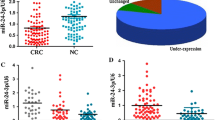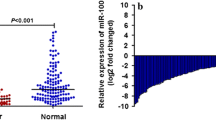Abstract
Aberrant miR-199a-3p expression has been reported in several cancers. However, the clinical significance of miR-199a-3p in human colorectal cancer has not been addressed. In this study, we detected miR-199a-3p expression in 92 colorectal cancer cases to evaluate its clinicopathologic characteristics in colorectal cancer. We showed that miR-199a-3p expression was significantly upregulated in cancer tissues than NATs. Clinicopathologic analysis revealed that high miR-199a-3p expression contributed to more advanced lymphatic invasion, lymph node metastasis, liver metastases and late TNM stage in colorectal cancer. Kaplan–Meier analysis showed that high expression of miR-199a-3p could lead to a significantly shorter overall survival rate. Cox’s proportional hazards model also indicated that the high expression of miR-199a-3p could serve as an independent and significant prognostic factor for survival. We transfected miR-199a-3p inhibitor into SW480 cells and observed that miR-199a-3p inhibitor could markedly inhibit the cell proliferation. Flow cytometry analysis also found that miR-199a-3p inhibitor could cause G0/G1 arrest, decreased percentage of S and G2/M phase and induce more cell apoptosis in SW480 cells. These results suggested that miR-199a-3p may serve as an efficient biomarker for diagnosis and novel prognostic indicator in colorectal cancer.


Similar content being viewed by others
References
Pourhoseingholi MA. Increased burden of colorectal cancer in Asia. World J Gastrointest Oncol. 2012;4:68–70.
Yeoh KG, Ho KY, Chiu HM, et al. The Asia-Pacific Colorectal Screening score: a validated tool that stratifies risk for colorectal advanced neoplasia in asymptomatic Asian subjects. Gut. 2011;60:1236–41.
Zafar SY, Malin JL, Grambow SC, et al. Chemotherapy use and patient treatment preferences in advanced colorectal cancer: a prospective cohort study. Cancer. 2012. doi:10.1002/cncr.27815.
Kelley RK, Wang G, Venook AP. Biomarker use in colorectal cancer therapy. J Natl Compr Canc Netw. 2011;9:1293–302.
Lee RC, Ambros V. An extensive class of small RNAs in Caenorhabditis elegans. Science. 2001;294:862–4.
Bartel DP. MicroRNAs: genomics, biogenesis, mechanism, and function. Cell. 2004;116:281–97.
Kunej T, Godnic I, Ferdin J, et al. Epigenetic regulation of microRNAs in cancer: an integrated review of literature. Mutat Res. 2011;717:77–84.
Jiang YW, Chen LA. microRNAs as tumor inhibitors, oncogenes, biomarkers for drug efficacy and outcome predictors in lung cancer (review). Mol Med Rep. 2012;5:890–4.
Luo X, Burwinkel B, Tao S, Brenner H. MicroRNA signatures: novel biomarker for colorectal cancer? Cancer Epidemiol Biomarkers Prev. 2011;20:1272–86.
Ranade AR, Cherba D, Sridhar S, et al. MicroRNA 92a–2*: a biomarker predictive for chemoresistance and prognostic for survival in patients with small cell lung cancer. J Thorac Oncol. 2010;5:1273–8.
Hwang JH, Voortman J, Giovannetti E, et al. Identification of microRNA-21 as a biomarker for chemoresistance and clinical outcome following adjuvant therapy in resectable pancreatic cancer. PLoS One. 2010;5:e10630.
Shigehara K, Yokomuro S, Ishibashi O, et al. Real-time PCR-based analysis of the human bile microRNAome identifies miR-9 as a potential diagnostic biomarker for biliary tract cancer. PLoS One. 2011;6:e23584.
Bockmeyer CL, Christgen M, Muller M, et al. MicroRNA profiles of healthy basal and luminal mammary epithelial cells are distinct and reflected in different breast cancer subtypes. Breast Cancer Res Treat. 2011;130:735–45.
Li C, Li JF, Cai Q, et al. MiRNA-199a-3p in plasma as a potential diagnostic biomarker for gastric cancer. Ann Surg Oncol. 2012.
Brenner B, Hoshen MB, Purim O, et al. MicroRNAs as a potential prognostic factor in gastric cancer. World J Gastroenterol. 2011;17:3976–85.
Lendvai G, Kiss A, Kovalszky I, Schaff Z. MicroRNAs in hepatocarcinogenesis. Orv Hetil. 2012;153:978–89.
Chen R, Alvero AB, Silasi DA, et al. Regulation of IKKbeta by miR-199a affects NF-kappaB activity in ovarian cancer cells. Oncogene. 2008;27:4712–23.
Duan Z, Choy E, Harmon D, et al. MicroRNA-199a-3p is downregulated in human osteosarcoma and regulates cell proliferation and migration. Mol Cancer Ther. 2011;10:1337–45.
Worthley DL, Leggett BA. Colorectal cancer: molecular features and clinical opportunities. Clin Biochem Rev. 2010;31:31–8.
Bedeir A, Krasinskas AM. Molecular diagnostics of colorectal cancer. Arch Pathol Lab Med. 2011;135:578–87.
Sanz Esponera J. Predictive molecular marker of distant metastasis in colorectal cancer. An R Acad Nac Med (Madr). 2003;120:545–55; discussion 555–7.
Perrotti D, Eiring AM. The new role of microRNAs in cancer. Future Oncol. 2010;6:1203–6.
Shatseva T, Lee DY, Deng Z, Yang BB. MicroRNA miR-199a-3p regulates cell proliferation and survival by targeting caveolin-2. J Cell Sci. 2011;124:2826–36.
Sablin MP, Italiano A, Spano JP. Colorectal cancers: prognostic and predictive factors of response to treatment. Bull Cancer. 2009;96:417–23.
Zlobec I, Lugli A. Prognostic and predictive factors in colorectal cancer. Postgrad Med J. 2008;84:403–11.
Acknowledgments
This work was supported by grants from Medical Science and Technology Development Foundation, Jiangsu Province Department of Health (No. H201013 and H201209), National Natural Science Foundation of China (No. 81130057 and 81201905) and Nature Science Research Grants in University of Jiangsu Province of P.R. China (No. 12KJB320009).
Conflict of interest
None.
Author information
Authors and Affiliations
Corresponding authors
Additional information
Daiwei Wan and Songbing He contributed equally to this work.
Rights and permissions
About this article
Cite this article
Wan, D., He, S., Xie, B. et al. Aberrant expression of miR-199a-3p and its clinical significance in colorectal cancers. Med Oncol 30, 378 (2013). https://doi.org/10.1007/s12032-012-0378-6
Received:
Accepted:
Published:
DOI: https://doi.org/10.1007/s12032-012-0378-6




